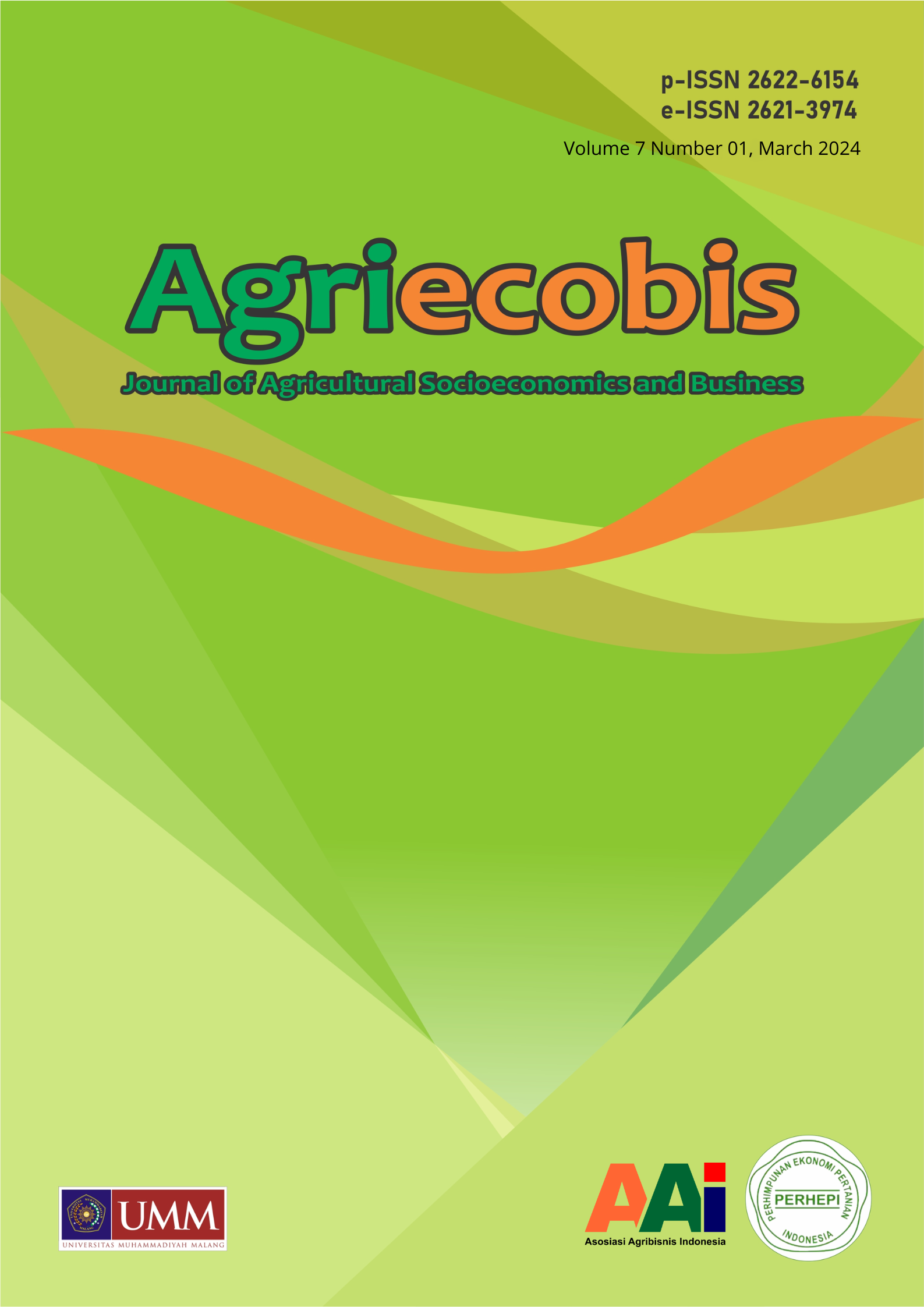Exploring Gender Dynamics in Sustainable Ecotourism: A Gender Perspective Review of Social Change and Livelihood Strategies Among the Tengger Tribe in Probolinggo District
DOI:
https://doi.org/10.22219/agriecobis.v7i01.31827Keywords:
Gender Dynamics, Livelihood Strategies, Sustainable Ecotourism, Socioeconomic Transformation, Tengger Tribe, Tourism DevelopmentAbstract
Probolinggo Regency in East Java presents notable tourist destinations and holds significant potential for sustainable ecotourism endeavors. Mount Bromo stands out as a prime natural attraction in this region of Indonesia, drawing both domestic and international visitors. The indigenous Tengger tribe inhabits the area surrounding Mount Bromo. With the goal of bolstering tourism, both locally and internationally, the Probolinggo Government has actively developed Mount Bromo's natural allure. This study aims to: 1) analyze the gender dynamics within horticultural farmer households in Ngadisari, Probolinggo, and 2) elucidate the catalysts and impediments to socioeconomic transformation within the Tengger tribe's engagement in ecotourism-related economic activities. Employing a qualitative approach with a gender perspective, this research deliberately selected Ngadisari, a village in Probolinggo, due to its pivotal role in supporting Mount Bromo's tourism and its predominantly Tengger population. Furthermore, Ngadisari has been earmarked by the Probolinggo authorities as a tourism-centric village. Data analysis entailed descriptive qualitative and gender analyses, with the aim of fostering the development of a gender-equitable, community-driven empowerment model.
Downloads
References
Andani, Faradilla. 2017. Peran Perempuan Dalam Kegiatan Pariwisata Di Kampung Wisata Tebing Tinggi Okura Kota Pekanbaru. Jom Fisip Vol. 4 No. 2.
Basriwijaya, et al. (2021). Bussines Analysis of Cattle Aceh at Langsa District. Advances in Social Science, Education and humanities Research, Vol 576.
Handayani. 2011. Buku Kearifan Lokal di Tengah Modernisasi. Kementerian Kebudayaan dan pariwisata Republik Indonesia.
Hubeis, A. V. (2010). Pemberdayaan Perempuan Dari Masa Ke Masa. Bogor: IPB Press
Manggala, H. D. A. (2019). Perubahan Sosial di Tosari (Studi Kasus Lunturnya Folklore Masyarakat Desa Tosari, Kecamatan Tosari, Kabupaten Pasuruan). Indonesian Journal of Sociology, Education, and Development, 1(2), 96–105. https://doi.org/10.52483/ijsed.v1i2.9
Sadilla, P. S. (2022). Indonesian Journal of Anthropology Multi Peran Perempuan: Studi Kasus pada Pedagang Di Tengger. 7(September), 113–120.
Wahono, P., Poernomo, D., & Kusumah, M. S. (2019). Strategy for developing sustainable ecotourism. IOP Conference Series: Earth and Environmental Science, 361(1). https://doi.org/10.1088/1755-1315/361/1/012014
Ramiyati, Asmi. 2022. Manifestasi Folklore Roro Anteng: Signifikasi Peran Perempuan dalam Kehidupan masyarakat Tengger. Jurnal Ilmu Sosial dan Humaniora: Vol. 11 No. 1: 82-92
Yoeti, Oka. 2000. Ekowisata: Pariwisata Berwawasan Lingkungan Hidup. Jakarta: PT Pertja.
Published
How to Cite
Issue
Section
License
Copyright (c) 2024 Agriecobis : Journal of Agricultural Socioeconomics and Business

This work is licensed under a Creative Commons Attribution-ShareAlike 4.0 International License.
Authors who publish with Agriecobis : Journal of Agricultural Socioeconomics and Business agree to the following terms:
- For all articles published in Agriecobis : Journal of Agricultural Socioeconomics and Business, copyright is retained by the authors. Authors give permission to the publisher to announce the work with conditions. When the manuscript is accepted for publication, the authors agree to automatic transfer of the publishing right to the publisher.
- Authors retain copyright and grant the journal right of first publication with the work simultaneously licensed under a Creative Commons Attribution-ShareAlike 4.0 International License that allows others to share the work with an acknowledgment of the work's authorship and initial publication in this journal.
- Authors are able to enter into separate, additional contractual arrangements for the non-exclusive distribution of the journal's published version of the work (e.g., post it to an institutional repository or publish it in a book), with an acknowledgment of its initial publication in this journal.
- Authors are permitted and encouraged to post their work online (e.g., in institutional repositories or on their website) prior to and during the submission process, as it can lead to productive exchanges, as well as earlier and greater citation of published wor (See The Effect of Open Access).

This work is licensed under a Creative Commons Attribution-ShareAlike 4.0 International License.







